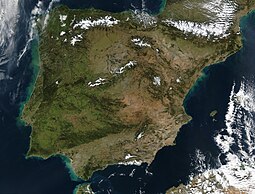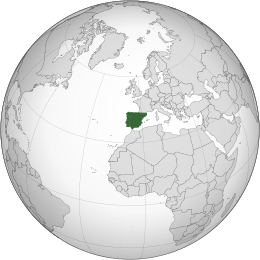Iberia
|
Native names
|
|
|---|---|

Satellite image of the Iberian Peninsula.
|
|
| Geography | |
| Location | Southwest Europe |
| Coordinates | 40°N 4°W / 40°N 4°WCoordinates: 40°N 4°W / 40°N 4°W |
| Area | 582,000 km2 (225,000 sq mi) |
| Highest elevation | 3,478 m (11,411 ft) |
| Highest point | Mulhacén |
| Administration | |
| Largest settlement | Andorra la Vella |
| Area covered | 468 km2 (181 sq mi; 0.1%) |
| Largest settlement | Lisbon |
| Area covered | 89,000 km2 (34,000 sq mi; 15.3%) |
| Largest settlement | Madrid |
| Area covered | 492,000 km2 (190,000 sq mi; 84.5%) |
| Largest settlement | Gibraltar |
| Area covered | 7 km2 (2.7 sq mi; 0%) |
| Largest settlement | Font-Romeu-Odeillo-Via (Pyrenees boundary) |
| Area covered | Undetermined |
| Demographics | |
| Demonym | Iberian |
| Population | Over 53 million |
| List of cities in the Iberian Peninsula by population | ||||||||||
|---|---|---|---|---|---|---|---|---|---|---|
| City/Town | Region & Country | Population (2011–12) | City/Town | Region & Country | Population (2011–12) | |||||
| 1 | Madrid | Madrid, Spain | 3,233,527 | 11 | Córdoba | Andalusia, Spain | 328,841 | |||
| 2 | Barcelona | Catalonia, Spain | 1,620,943 | 12 | Valladolid | Castile and León, Spain | 311,501 | |||
| 3 | Valencia | Valencia, Spain | 797,028 | 13 | Vigo | Galicia, Spain | 297,733 | |||
| 4 | Seville | Andalusia, Spain | 702,355 | 14 | Vila Nova de Gaia | Norte, Portugal | 288,749 | |||
| 5 | Zaragoza | Aragon, Spain | 679,624 | 15 | Gijón | Asturias, Spain | 277,554 | |||
| 6 | Málaga | Andalusia, Spain | 567,433 | 16 | L'Hospitalet | Catalonia, Spain | 257,057 | |||
| 7 | Lisbon | Lisboa, Portugal | 547,631 | 17 | A Coruña | Galicia, Spain | 246,146 | |||
| 8 | Murcia | Murcia, Spain | 441,354 | 18 | Vitoria-Gasteiz | Basque Country, Spain | 242,223 | |||
| 9 | Bilbao | Basque Country, Spain | 351,629 | 19 | Porto | Norte, Portugal | 237,591 | |||
| 10 | Alicante | Valencia, Spain | 334,678 | 20 | Granada | Andalusia, Spain | 237,540 | |||
The Iberian Peninsula /aɪˈbɪəriən pəˈnɪnsjᵿlə/, also known as Iberia /aɪˈbɪəriə/, is located in the southwest corner of Europe. The peninsula is principally divided between Portugal and Spain, comprising most of their territory. It also includes Andorra and a small part of France along the peninsula's northeastern edge, as well as Gibraltar on its south coast, a small peninsula which forms an overseas territory of the United Kingdom. With an area of approximately 582,000 km2 (225,000 sq mi), it is the second largest European peninsula, after the Scandinavian.
The English word Iberia was adapted from the use of the Ancient Greek word Ἰβηρία (Ibēría) by Greek geographers under the rule of the Roman Empire to refer to what is known today in English as the Iberian Peninsula. At that time, the name did not describe a single political entity or a distinct population of people. Strabo's Iberia was delineated from Keltikē (Gaul) by the Pyrenees and included the entire land mass southwest (he says "west") of there.
...
Wikipedia

